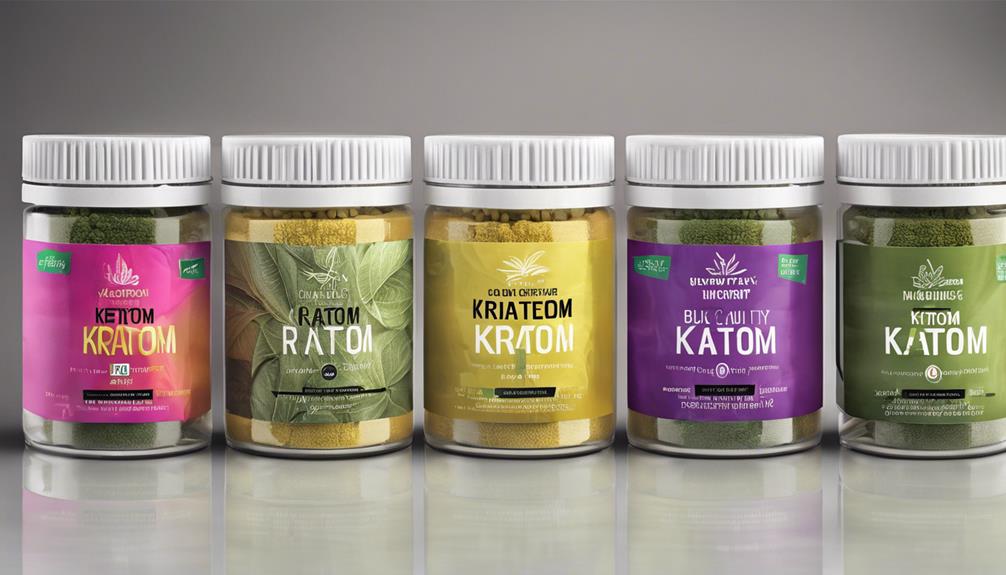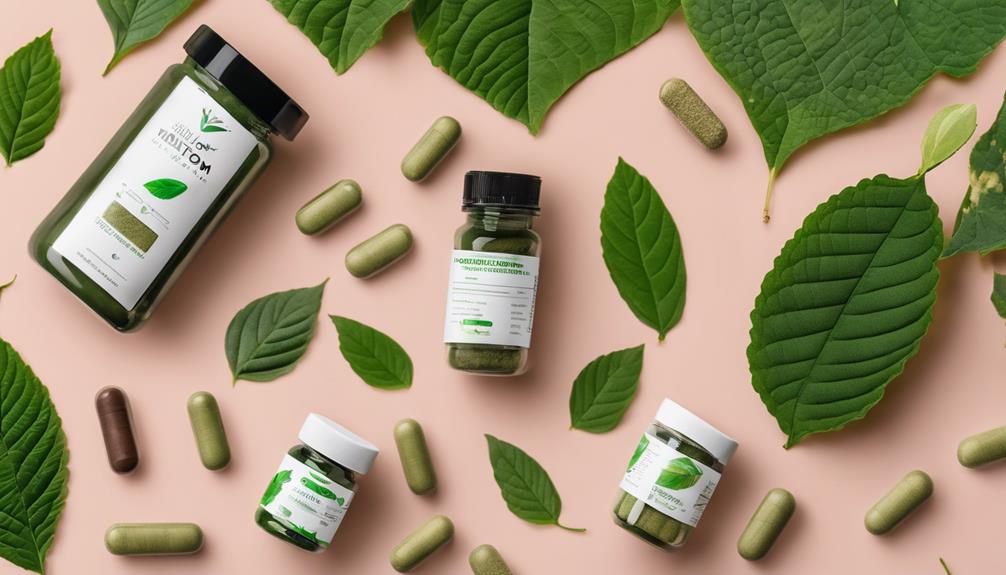Deprecated: mb_convert_encoding(): Handling HTML entities via mbstring is deprecated; use htmlspecialchars, htmlentities, or mb_encode_numericentity/mb_decode_numericentity instead in /home/users/kratomfiles/www/kratomfiles.com/wp-content/plugins/quick-adsense-reloaded/includes/template-functions.php on line 3552
Are you curious about the synergistic effects of Ashwagandha and Kratom? These two herbal supplements have gained popularity for their individual health benefits, but when combined, they may offer even more potential advantages. From stress reduction to improved mood and energy levels, Ashwagandha Kratom has piqued the interest of many. But before you dive into this intriguing combination, there are essential factors to consider regarding their origins, health benefits, similarities, differences, safety, and recommended usage. So, let's explore the world of Ashwagandha Kratom and uncover the potential it holds for your well-being.
Origins and History

Kratom and Ashwagandha have deep-rooted origins and a rich historical background in their respective regions, making them culturally significant and revered for their traditional medicinal use. Let's start with Kratom. This evergreen tree is native to Southeast Asia, specifically countries like Thailand, Malaysia, Indonesia, and Papua New Guinea. For centuries, the people of these regions have been using Kratom for its various effects. The leaves of the tree are typically dried and ground into a fine powder, which can then be consumed.
In Southeast Asia, Kratom has been traditionally used as a stimulant, similar to coffee, to increase energy and focus. It has also been used as a pain reliever and to alleviate symptoms of opium withdrawal. However, it is important to note that Kratom should be used in moderation and at safe doses.
Now let's turn our attention to Ashwagandha. This evergreen shrub is native to India, the Middle East, and parts of Africa, where it has been used for centuries in traditional medicine. Known as an adaptogen, Ashwagandha helps the body cope with stress and promotes overall well-being. It has been used to enhance cognitive function, support a healthy immune system, and improve physical endurance.
The origins and historical use of both Kratom and Ashwagandha highlight their cultural significance and the wisdom of traditional medicinal practices. Both substances have been used by communities for a long time, and their effects have been observed and documented. However, it is important to approach their use with caution and consult with a healthcare professional to ensure safe and appropriate doses.
Health Benefits
As we shift our focus to the health benefits, it is important to explore the potential advantages that both Ashwagandha and Kratom offer when incorporated into a holistic wellness routine. These natural herbs have been used for centuries in traditional medicine and may provide various benefits for your overall well-being. Here are four potential health benefits of Ashwagandha and Kratom:
- Stress and Discomfort Relief: Ashwagandha may combat stress, discomfort, and fatigue, helping you find a sense of calm and relaxation. Similarly, Kratom can relieve stress and physical discomfort, promoting a soothing effect based on the dosage. By incorporating both herbs into your routine, you can potentially experience enhanced relaxation and reduced feelings of unease.
- Cognitive Support and Energy Boost: Ashwagandha has shown potential benefits for cognitive function, including improved memory and focus. On the other hand, Kratom is known for its energizing effects at lower doses, providing a natural boost of energy. By combining Ashwagandha and Kratom, you may experience improved mental clarity and increased vitality.
- Male Fertility and Well-being: Ashwagandha has been traditionally used to support male fertility by promoting healthy sperm production and motility. Incorporating Ashwagandha into your routine may help improve your reproductive health and overall well-being.
- Mood Enhancement and Pain Relief: Both Ashwagandha and Kratom have the potential to enhance mood and provide pain relief. By consuming these herbs together, you may experience improved mood, reduced stress, and relief from physical discomfort.
Similarities and Differences

When comparing Ashwagandha and Kratom, it is important to consider their similarities and differences in order to make an informed decision about incorporating them into your holistic wellness routine. Both Ashwagandha and Kratom are natural remedies that have been used for centuries to promote overall well-being. However, they differ in terms of their effects, metabolism, and potential interactions.
| Ashwagandha | Kratom | |
|---|---|---|
| Effects | Known for its calming and stress-relieving properties, Ashwagandha can help promote relaxation and improve sleep quality. It may also enhance cognitive function and support a healthy immune system. | Kratom is often used for its energizing and mood-enhancing effects. It can also provide pain relief and aid in managing anxiety and depression. |
| Metabolism | Ashwagandha is primarily metabolized in the liver and excreted through the kidneys. It has a relatively long half-life, which means its effects can last for several hours. | Kratom is metabolized in the liver and its effects can be felt within 10 to 15 minutes after consumption. Its duration of action varies depending on the strain and dosage. |
| Interactions | Ashwagandha has a low risk of interactions with other medications or supplements. However, it is always advisable to consult with a healthcare professional before combining it with any other substances. | Kratom may interact with certain medications, such as antidepressants and opioids. It is important to exercise caution and seek medical advice before using Kratom in combination with other substances. |
Both Ashwagandha and Kratom offer unique benefits and can be incorporated into your holistic wellness routine. However, it is crucial to understand their effects, metabolism, and potential interactions before combining them together. By doing so, you can ensure their safe and effective use for optimal relief and well-being. Remember to consult with a healthcare professional for personalized advice and guidance.
Safety and Interaction
Is it safe to combine Ashwagandha and Kratom for optimal relief and well-being in your holistic wellness routine? Here are some important facts to consider regarding the safety and interaction of these two herbs:
- Synergistic Effects: Combining Ashwagandha and Kratom may lead to synergistic effects, intensifying relaxation and enhancing pain relief. This can be beneficial for those seeking holistic relief.
- Consultation is Key: It is important to consult a physician before regularly using both Ashwagandha and Kratom. While the interaction between these herbs can be indirect and mild, professional guidance ensures your safety and well-being.
- Side Effects: Ashwagandha may enhance the relaxing properties of Kratom. However, long-term or high-dose consumption of both herbs may lead to stronger side effects. It is essential to be mindful of your dosage and listen to your body.
- Metabolism Influence: Ashwagandha may speed up the metabolism of Kratom due to its influence on liver enzymes. This can potentially affect the effectiveness of Kratom in your body. Monitoring your response to the combination is important for optimal results.
While there is scientific evidence supporting the potential benefits of combining Ashwagandha and Kratom, it is crucial to approach their combination with caution. Start with low doses and gradually increase if needed, paying close attention to how your body responds. Remember, each individual is unique, and what works for one person may not work for another. Prioritizing safety and self-awareness is key to finding the right balance for your holistic wellness routine.
What Are the Benefits of Using Ashwagandha and Kratom Together?
When it comes to the ashwagandha and kratom comparison, using them together can offer a wide range of benefits. Ashwagandha is known for its stress-relieving properties, while kratom is appreciated for its pain management and energy-boosting effects. Together, they can provide a powerful combination for overall wellbeing.
What Are the Benefits and Risks of Combining Ashwagandha and Kratom?
When it comes to the ashwagandha and kratom comparison, there are potential benefits and risks to consider. Ashwagandha is known for its stress-relieving properties, while kratom is often used for pain management. Combining the two may enhance their individual effects, but it could also pose a risk of adverse reactions. It’s important to consult a healthcare professional before combining these two substances.
Recommended Dosage and Usage

To ensure safe and effective usage of Ashwagandha and Kratom, it is important to establish the recommended dosage and usage guidelines for these herbs. When it comes to dosage, it is advised to start with a low amount, especially when combining Ashwagandha and Kratom supplements, as this will allow you to assess your individual tolerance and effects. Gradually increase the dosage if needed, but always closely monitor the effects to find the optimal level for your desired benefits.
Frequency is another important aspect to consider. It is recommended to avoid frequent or daily usage, particularly with Kratom, to minimize the risk of dependency and tolerance buildup. This will help maintain the effectiveness of both herbs over the long term.
When determining the appropriate dosage for each herb, it is crucial to take into account individual factors such as body weight, overall health, and sensitivity to substances. These factors can vary from person to person, so it is essential to adjust the dosage accordingly for optimal results.
For a holistic and evidence-based approach, it is advisable to consult a healthcare professional or herbal medicine expert. They can provide guidance and ensure safe and appropriate usage, especially when combining Ashwagandha and Kratom or considering long-term consumption. Their expertise will help you navigate the dosage and usage guidelines to achieve the best possible outcomes.
Ashwagandha and Kratom have been used for various purposes, including pain relief for chronic pain. By following the recommended dosage and usage guidelines, you can maximize the benefits of these herbs while minimizing any potential risks. Remember, it is always important to prioritize your well-being and consult a healthcare professional for personalized advice.
Frequently Asked Questions
Can Ashwagandha Kratom Be Used as a Substitute for Traditional Medication?
Looking for a substitute for traditional medication? Consider the efficacy of ashwagandha kratom. Many users have reported positive experiences with this natural remedy. Finding the right dosage is key for optimal results. While long term effects on overall health and well-being are still being studied, ashwagandha kratom shows promise as an alternative treatment for anxiety and depression. Clinical studies are providing scientific evidence of its effectiveness. Combine ashwagandha kratom with lifestyle changes for maximum benefits.
Are There Any Known Side Effects or Risks Associated With Combining Ashwagandha Kratom With Other Herbal Supplements?
When considering the combination of herbal supplements, it's important to be aware of potential risks and side effects. Long-term effects of combining ashwagandha kratom with other herbs are not well-studied. Recommended dosages should be followed to minimize any possible risks. Combining with alcohol may increase the risk of negative effects on liver function. Allergic reactions and interactions with other drugs are also possible. It's crucial to consider the impact on mental health, especially if you're already experiencing mental health conditions. Safety for children and potential addiction risks should also be taken into account.
Can Ashwagandha Kratom Be Taken by Pregnant or Breastfeeding Women?
During pregnancy or breastfeeding, it is important to prioritize the safety of both you and your baby. When it comes to ashwagandha kratom, it's crucial to consult with your healthcare provider before using it. They can provide guidance on the potential benefits and risks, recommend appropriate dosage, and discuss alternatives if needed. Research on the effects of ashwagandha kratom on fetal development is limited, so caution is advised. Remember, open communication with your healthcare provider is essential for making informed decisions.
Does Ashwagandha Kratom Have Any Known Interactions With Prescription Medications?
When it comes to the potential interactions between ashwagandha kratom and prescription medications, it's important to be cautious. While ashwagandha kratom has shown potential benefits for anxiety relief, managing chronic pain, improving sleep quality, enhancing cognitive function, and reducing stress levels, its impact on mood and depression and its potential anti-inflammatory properties are still being explored. However, if you're considering using ashwagandha kratom alongside anti-depressant medications, it's best to consult with your healthcare provider to ensure safety and avoid any potential negative interactions.
Are There Any Specific Guidelines for Storing Ashwagandha Kratom to Ensure Its Potency and Freshness?
To ensure the potency and freshness of ashwagandha kratom, it's important to follow specific guidelines for storing it. Keep it in a cool, dry place away from direct sunlight. This will help maintain its beneficial properties and prevent degradation. Remember to always check the expiration date and discard any expired products. By storing ashwagandha kratom properly, you can maximize its effectiveness and enjoy its potential benefits for your mental health, sleep, weight loss, stress relief, immune system, energy levels, and athletic performance.










